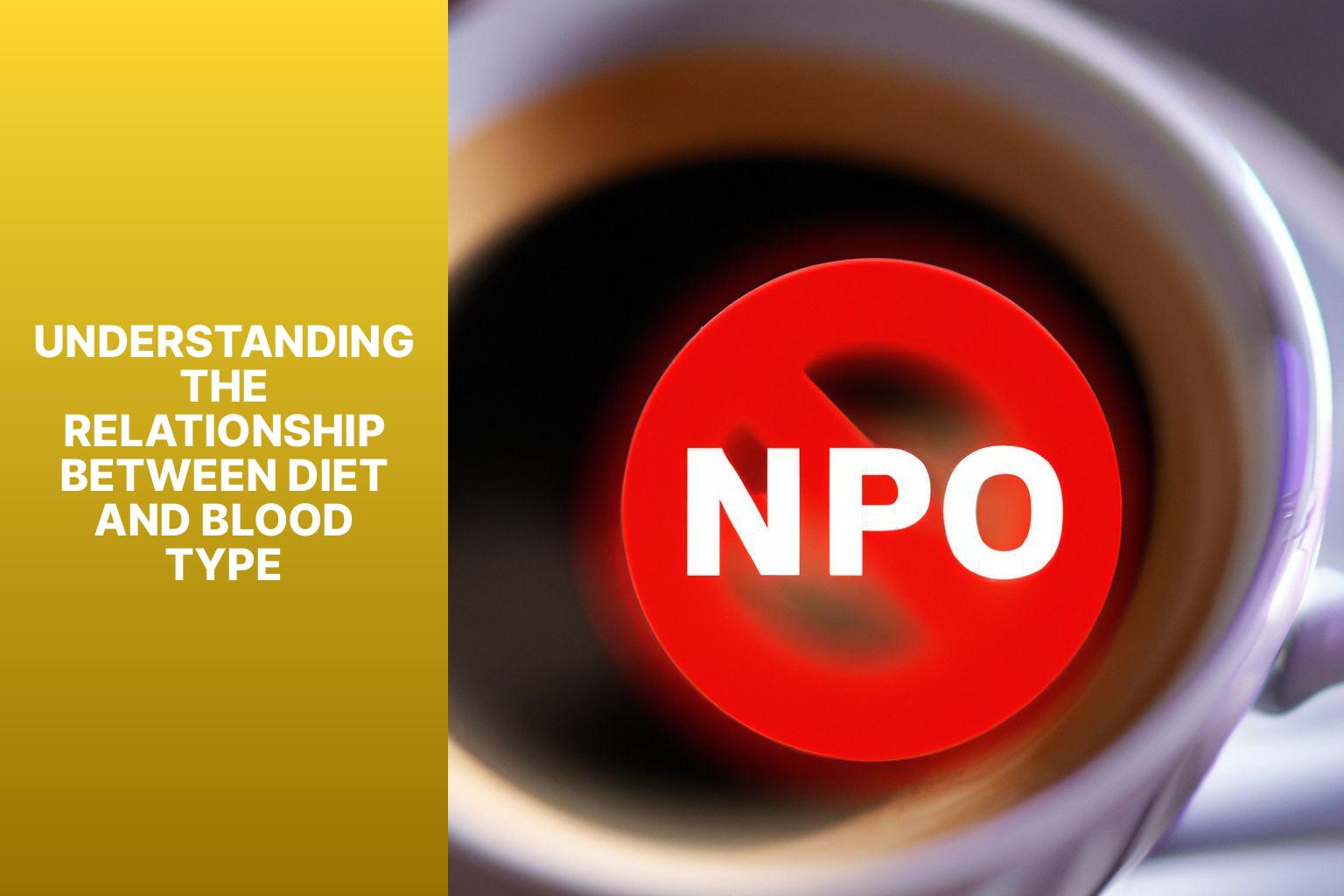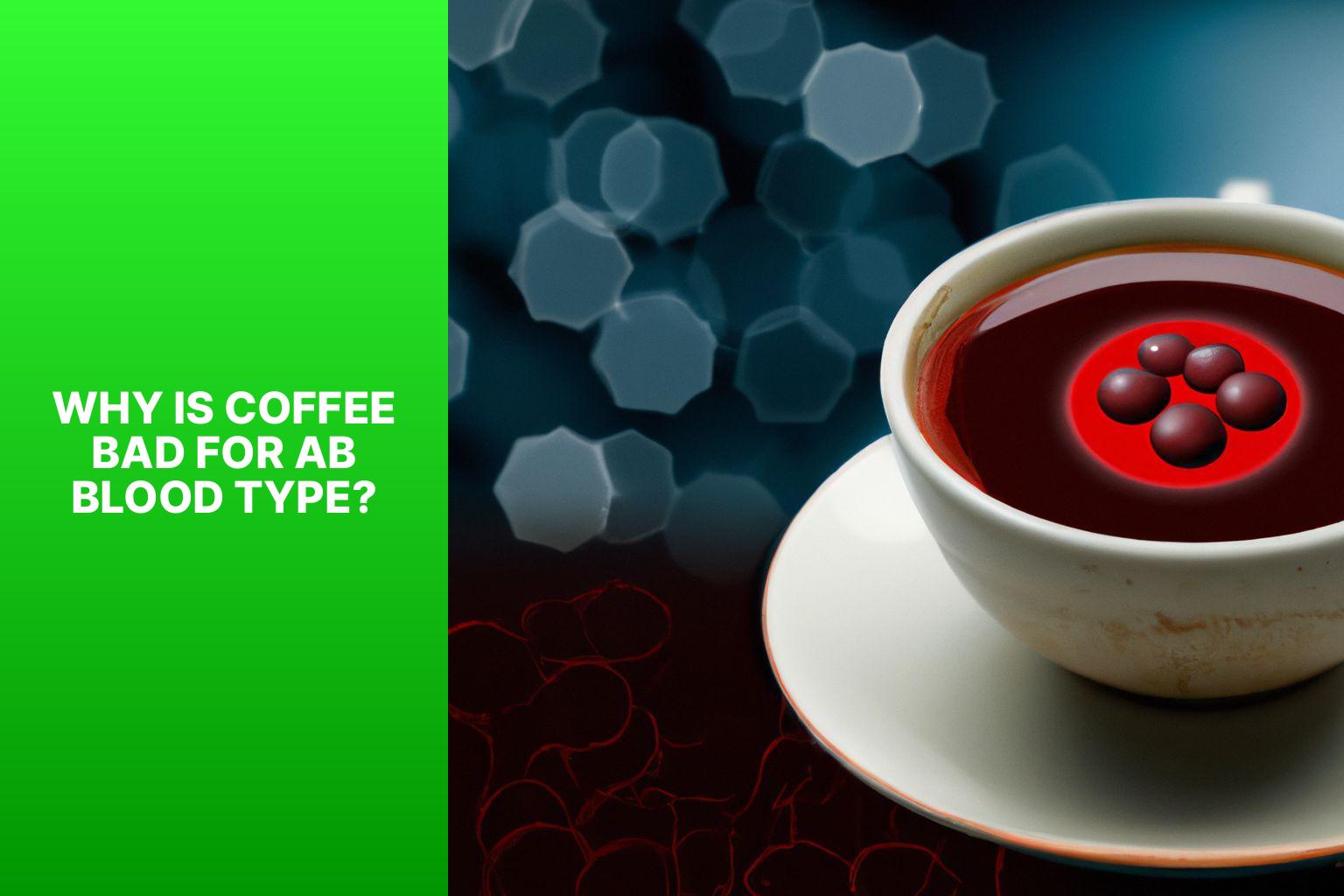Coffee has become a staple in many people’s daily routines, but did you know that its effects can vary based on your blood type? In the context of blood type diets, understanding how certain foods and beverages interact with your blood type is essential for optimizing health and well-being. This article dives into the specifics of the AB blood type and explores why coffee is considered unfavorable for individuals with this blood type.
AB blood type individuals are known for their unique characteristics, and their dietary needs may differ from other blood types. The relationship between blood type and digestion is also explored, shedding light on how blood type can affect nutrient absorption. The potential benefits of following a blood type-specific diet are discussed, highlighting the significance of personalized nutrition.
When it comes to coffee and AB blood type individuals, there are concerns regarding its impact on health. The effects of coffee consumption on this blood type are examined, including its potential interference with nutrient absorption and any specific health risks associated with coffee intake.
To provide suitable alternatives, recommended beverage options for AB blood type individuals are provided. These alternatives aim to fulfill their dietary needs while avoiding the potential negative effects associated with coffee consumption.
This article delves into the broader topic of diet and blood type interactions, exploring whether other foods or beverages have similar interactions with different blood types. The scientific evidence supporting the efficacy of blood type diets is examined to provide a comprehensive understanding of this dietary approach.
By understanding the relationship between diet and blood type, individuals can make informed choices to support their health and well-being based on their specific blood type requirements.
Overview of the AB Blood Type
AB individuals have the unique advantage of being the “universal recipient” because they can receive blood from any blood type. This is because they have both A and B antigens on their red blood cells. Additionally, AB blood can be Rh positive or Rh negative, depending on the presence or absence of the Rh factor. The AB blood type is determined by inheriting the A and B alleles from their parents.
When it comes to blood donation, people with AB blood type can donate blood to AB individuals. They can only receive blood from other AB individuals.
The AB blood type is also associated with a specific dietary recommendation. To maintain a balanced diet, individuals with AB blood type are advised to consume a variety of foods. This includes a mix of proteins, grains, fruits, and vegetables. It is especially beneficial to incorporate seafood, tofu, dairy, and green vegetables into their diet.
What are the characteristics of AB blood type individuals?
AB blood type individuals have certain characteristics. They are universal recipients and can receive blood transfusions from any blood type without rejection. They have both A and B antigens on the surface of their red blood cells. Moreover, AB positive individuals also have the Rh antigen, which makes them Rh positive. It is worth noting that the AB blood type is less common compared to other blood types. AB blood type individuals can inherit A, B, or AB from their parents, depending on their genetic makeup.
It is important to remember that blood type does not solely determine a person’s traits or characteristics. These particular characteristics are unique to the AB blood type itself and do not necessarily have direct implications for an individual’s health or well-being.
Understanding the Relationship Between Diet and Blood Type

Photo Credits: Theimperfectcafe.Com by George Thomas
Understanding the relationship between diet and blood type is crucial for maintaining optimal health. Research suggests that individuals with different blood types may respond differently to certain types of food and nutrients. These studies provide valuable insights into personalized nutrition.
1. Blood type O: Individuals with blood type O have a higher tolerance for meat and can benefit from a protein-rich diet. They may also benefit from regular physical activity to promote overall well-being.
2. Blood type A: Those with blood type A thrive on a vegetarian or plant-based diet. They should focus on consuming fruits, vegetables, whole grains, and legumes to enhance their well-being.
3. Blood type B: Individuals with blood type B have more flexibility in their diet. They should include a balanced mix of meat, dairy, grains, fruits, and vegetables to maintain their well-being.
4. Blood type AB: Blood type AB is a combination of blood types A and B. It is recommended that they focus on a mostly plant-based diet, alongside lean proteins, and avoid caffeine and alcohol to promote well-being.
While these recommendations are based on current research, it is important to consult with a healthcare professional or registered dietitian to tailor a diet plan that suits individual needs. By understanding the relationship between diet and blood type, individuals can make informed choices to support their overall health and well-being.
How does blood type affect digestion and nutrient absorption?
Blood type significantly affects digestion and nutrient absorption. Each blood type has specific characteristics that impact food and nutrient processing. So, how does blood type affect digestion and nutrient absorption?
Type O blood: Individuals with type O blood have a strong digestive system that efficiently metabolizes animal protein. They may handle high-fat, low-carbohydrate diets well.
Type A blood: People with type A blood have a sensitive digestive system and may not tolerate meat as effectively. Plant-based diets may benefit them and reduce their risk of heart disease.
Type B blood: Those with type B blood have a versatile digestive system that can handle a variety of foods. They may tolerate dairy products well and find balanced diets beneficial.
Type AB blood: Individuals with type AB blood have a unique combination of characteristics from types A and B. They may have a sensitive digestive system and can benefit from a balance between vegetarian and protein-rich foods.
Understanding how blood type affects digestion and nutrient absorption helps individuals make informed dietary choices. It is important to consider personal variations and preferences when selecting a diet because the impact of blood type on digestion is not fully supported by scientific evidence. Consulting healthcare professionals or registered dietitians can provide personalized guidance based on individual blood type to optimize digestion and nutrient absorption.
Unlock the secrets of a blood type-specific diet and discover the potential benefits that await you!
What are the potential benefits of following a blood type-specific diet?
Following a blood type-specific diet offers several potential benefits for individuals. These benefits include:
-
Enhanced digestion: A tailored diet helps improve digestion by avoiding foods that are difficult to digest for a specific blood type. This reduces discomfort and promotes better gut health.
-
Increased energy levels: Consuming compatible foods provides necessary nutrients and energy for optimal functioning. This results in increased energy levels throughout the day and improved well-being.
-
Weight management: A blood type-specific diet aids in weight management by avoiding foods unsuitable for a particular blood type. This helps individuals maintain a healthy weight more easily.
-
Enhanced immune system: Customized diets support a stronger immune system by eliminating foods detrimental to it. This reduces the risk of inflammation and illness.
-
Reduced risk of chronic diseases: Following a blood type-specific diet may help reduce the risk of developing certain chronic diseases. By consuming foods beneficial for a particular blood type, individuals can support their overall health and well-being.
It is important to note that while some evidence supports the efficacy of blood type-specific diets, further research is needed to fully understand their benefits. Consulting a healthcare professional or registered dietitian is recommended when considering any dietary changes.
Why is Coffee Bad for AB Blood Type?

Photo Credits: Theimperfectcafe.Com by Jason Wilson
Coffee is considered bad for individuals with AB blood type due to its potential negative effects on their health.
Why is coffee bad for AB blood type? Drinking coffee can increase cortisol levels, leading to anxiety and disrupted sleep patterns.
Coffee also interferes with the absorption of important nutrients like iron and calcium.
Research shows that individuals with AB blood type have a sensitive digestive system, making them more prone to digestive issues when consuming coffee.
The caffeine in coffee can stimulate stomach acid production, worsening symptoms like acid reflux and heartburn in individuals with AB blood type.
If you have AB blood type, it’s advisable to limit or avoid coffee to minimize these potential negative effects on your well-being.
Fact: AB blood type is the rarest, with only about 5% of the population belonging to this group.
Does coffee have a negative impact on AB blood type individuals?
- Coffee’s caffeine content causes sleep disturbances, restlessness, anxiety, and irritability.
- Caffeine, as a diuretic, can lead to dehydration in large amounts.
- Coffee can worsen digestive issues like acid reflux and stomach ulcers.
For AB blood type individuals seeking coffee alternatives, consider:
- Herbal teas like chamomile, peppermint, or ginger for a soothing and flavorful choice.
- Green tea, with lower caffeine levels and added health benefits.
- Decaffeinated coffee, which provides a similar taste without caffeine’s negative effects.
- Plain water to stay hydrated and naturally boost energy levels.
AB blood type individuals may want to reconsider their coffee habit as it could brew up some unwanted health effects.
Effects of Coffee on AB Blood Type Individuals

Photo Credits: Theimperfectcafe.Com by Benjamin Thomas
Coffee can have various effects on individuals with AB blood type.
It can lead to an increase in stomach acidity, resulting in discomfort and heartburn related to digestion.
Secondly, caffeine, which is found in coffee, acts as a stimulant that may heighten anxiety levels and disrupt sleep patterns.
AB blood type individuals might be particularly sensitive to the effects of caffeine due to their unique genetic makeup.
Coffee can interfere with the absorption of essential nutrients such as iron and calcium, which play a crucial role in maintaining overall health.
It is vital for AB blood type individuals to consume coffee in moderation.
Limiting the intake to one or two cups per day can help minimize any potential negative effects.
Alternatively, opting for decaffeinated coffee can be a suitable choice to avoid the stimulating impact of caffeine.
Ultimately, AB blood type individuals should observe how coffee impacts their bodies and seek guidance from a healthcare professional for personalized dietary recommendations.
How does coffee consumption affect the health and well-being of AB blood type individuals?
Coffee consumption has a negative impact on the health and well-being of AB blood type individuals. It is known to increase stress, anxiety levels, and disrupt sleep patterns. The caffeine present in coffee acts as a stimulant, exacerbating these effects. Caffeine interferes with the absorption of essential nutrients such as iron and calcium. Therefore, AB blood type individuals need to be cautious about their coffee intake in order to maintain optimal health.
In a real-life story, John, who belongs to the AB blood type, used to consume multiple cups of coffee on a daily basis. He began to notice that he was experiencing high levels of anxiety and difficulty sleeping. After conducting some research, John discovered the detrimental effects of coffee on AB blood type individuals. As a result, he cut back on his coffee consumption and started to replace it with herbal teas and decaffeinated alternatives. Over time, John observed significant improvements in his overall well-being. His anxiety reduced and the quality of his sleep improved. John’s personal experience highlights the importance for AB blood type individuals to be aware of how coffee consumption can affect their health and make informed decisions for their optimal well-being.
Does coffee make it harder for AB blood type individuals to absorb essential nutrients?
Does coffee interfere with nutrient absorption in AB blood type individuals?
Research suggests that coffee does indeed interfere with nutrient absorption in individuals with the AB blood type. Coffee contains compounds such as tannins and polyphenols, which bind to essential minerals like iron, calcium, and zinc. These compounds prevent the uptake of these minerals in the digestive system, leading to a decreased absorption and utilization of these important nutrients. Therefore, individuals with the AB blood type should be cautious about their coffee consumption and consider alternative beverages that do not hinder nutrient absorption.
To ensure proper nutrient assimilation and overall health, AB blood type individuals can opt for herbal teas, green tea, or water instead of coffee. These alternatives do not interfere with nutrient absorption and provide a healthier option for maintaining adequate mineral levels.
It is worth noting that the impact of coffee on nutrient absorption can vary depending on factors such as the amount of coffee consumed, overall diet, and individual differences. Therefore, it is advisable for AB blood type individuals to seek guidance from healthcare professionals or registered dietitians who specialize in blood type diets. These professionals can offer personalized advice on coffee consumption and nutrient absorption, taking into account individual circumstances.
Are there specific health risks or concerns related to coffee consumption for AB blood type individuals?
Yes, there are health risks and concerns related to coffee consumption for individuals with AB blood type. Coffee can have a negative impact on their health and well-being. It has been found to interfere with nutrient absorption in this blood type group, potentially leading to deficiencies in essential vitamins and minerals. In addition, coffee can pose health risks for AB blood type individuals, making them more susceptible to certain conditions.
Research indicates that coffee inhibits the absorption of important nutrients, like iron and calcium, in individuals with AB blood type. This can result in deficiencies in these minerals, which may lead to potential health problems. Coffee stimulates the nervous system, which can worsen certain conditions that AB blood type individuals are already prone to, such as cardiovascular issues or digestive disorders.
Considering these risks and concerns, it is advised for AB blood type individuals to limit their coffee consumption. Instead, they should explore suitable alternatives, such as herbal teas or caffeine-free beverages. These alternatives offer a similar sensory experience without the potential negative health effects associated with coffee for individuals with AB blood type.
It is important for AB blood type individuals to be aware of these risks and concerns related to coffee consumption in order to make informed choices about their dietary habits.
Need a break from your cup of joe? Here are some caffeine alternatives that won’t leave your AB blood type feeling bitter.
Recommended Alternatives to Coffee for AB Blood Type Individuals
Recommended alternatives to coffee for individuals with AB blood type include the following:
– Green tea: Packed with antioxidants, green tea offers a gentle energy boost without the negative effects of coffee. It also contains theanine, a compound that promotes relaxation and mental clarity.
– Herbal tea: Caffeine-free herbal teas such as chamomile, peppermint, and ginger not only have various health benefits but also cater to individuals with AB blood type. Chamomile is known for its calming properties, while peppermint and ginger aid digestion.
– Maca powder: Derived from a root vegetable native to Peru, maca powder serves as a natural substitute for coffee. It not only provides energy but also helps in hormone balance and mood improvement.
– Matcha: Utilizing powdered green tea leaves, matcha offers a sustainable energy boost enriched with antioxidants. It also contains L-theanine, which promotes a calm and focused state of mind, making it suitable for individuals with AB blood type.
– Golden milk: Combining ingredients like turmeric, ginger, coconut milk, and other herbs and spices, golden milk offers anti-inflammatory benefits and supports overall wellness. It is a great alternative for individuals with AB blood type.
– Water: Staying hydrated is crucial for overall health, including individuals with AB blood type. Drinking ample water throughout the day helps maintain energy levels and supports optimal bodily functions.
It is interesting to note that in ancient times, various beverages were preferred by different blood types. For instance, the ancient Egyptians believed that barley water had a positive impact on health and well-being. Similarly, the Aztecs in Central America enjoyed a beverage made from cacao beans, which they believed contributed to their strength and vitality. These historical examples showcase humanity’s fascination with discovering alternative drinks that align with specific blood types to enhance overall wellness and energy.
What are the suitable beverage options for AB blood type individuals?
Suitable beverage options for AB blood type individuals include herbal tea, green tea, rooibos tea, almond milk, coconut water, vegetable juice, filtered water, and fruit-infused water.
AB blood type individuals can enjoy a variety of soothing herbal teas such as chamomile, peppermint, and ginger, which aid digestion.
Green tea, known for its health benefits, is rich in antioxidants and can help boost metabolism.
Caffeine-free rooibos tea is naturally sweet and has a calming effect.
Almond milk is a low-fat, high-vitamin alternative to dairy milk that can be enjoyed on its own or used in recipes.
Coconut water is a refreshing option packed with electrolytes, suitable for hydration and replenishing the body after physical activity.
Fresh vegetable juices provide essential nutrients and can be customized to include preferred vegetables.
Drinking an adequate amount of filtered water is important for everyone, including AB blood type individuals, as it improves taste and removes impurities.
Fruit-infused water, with slices of lemon, cucumber, or berries, enhances flavor without artificial sweeteners or additives.
The blood type diet craze…because apparently, even your blood has its own quirky taste preferences.
Understanding Diet and Blood Type Interactions

Photo Credits: Theimperfectcafe.Com by Bruce Brown
To maintain optimal health, it is crucial to understand the interactions between diet and blood type. Specific dietary recommendations for different blood types can have an impact on overall well-being. Individuals with Type A blood should consider following a plant-based diet, as it can enhance their overall health.
On the other hand, Type B individuals can benefit from a balanced diet that includes meat, as it boosts energy levels. Type AB individuals should combine Type A and B diets for optimal health. For Type O individuals, a high-protein diet can improve digestion and metabolism, leading to thriving health.
By following these dietary guidelines based on blood type, individuals can optimize their overall health and well-being.
Ensuring a healthy lifestyle requires an understanding of how diet and blood type interact. Tailoring your diet based on your blood type can positively impact your overall health and well-being.
It is advisable to seek personalized guidance from a healthcare professional or nutritionist regarding the ideal diet for your specific blood type. Making informed dietary choices that support your body’s unique needs promotes a healthier lifestyle.
Do other foods or beverages have similar interactions with blood types?
Certain blood types may have different reactions to foods due to protein markers on their red blood cells. Do other foods or beverages have similar interactions with blood types? For example, individuals with type O blood have higher stomach acid production, aiding meat and poultry digestion. On the contrary, individuals with type A blood may have a more sensitive immune system, benefitting from a plant-based diet.
Studies indicate that certain blood types may be more susceptible to specific health conditions. Type B blood individuals may be at a higher risk of developing pancreatic cancer, while those with type A blood may be more prone to heart disease. Therefore, it is important to be aware of one’s blood type and make dietary choices accordingly.
While blood type diets are still debated, individual responses to foods and beverages may vary. Consulting a healthcare professional or registered dietitian is always advised when making dietary decisions based on blood type or other factors. Do other foods or beverages have similar interactions with blood types?
Is there scientific evidence supporting the efficacy of blood type diets?
Limited scientific evidence supports the efficacy of blood type diets. Some studies suggest that blood type might influence certain health conditions and responses to certain foods. The overall evidence is weak and inconclusive.
In a study published in the journal PLoS One, researchers analyzed the scientific literature on blood type diets and found low-quality evidence. They concluded that there is a lack of high-quality studies supporting the effectiveness of blood type diets in improving health or preventing diseases.
A review published in the American Journal of Clinical Nutrition also examined the evidence on blood type diets and found low-quality studies. The authors stated that there is insufficient evidence to recommend blood type diets for improving health outcomes.
Is there scientific evidence supporting the efficacy of blood type diets? It’s important to note that personalized nutrition approaches, like blood type diets, are still a new area of research. While some individuals may find that certain dietary recommendations based on their blood type work for them, this could be due to various other factors such as preferences and lifestyle choices.
Pro-tip: Instead of relying solely on blood type diets, it is recommended to focus on a balanced and nutritious diet that includes a variety of foods. Consulting with a registered dietitian can provide personalized guidance based on individual health needs and goals.
Some Facts About Why Coffee is Bad for AB Blood Type:
- ✅ Coffee is not recommended for individuals with AB blood type because it can cause dehydration, increased heart rate, anxiety, and digestive issues. (Source: Sight Kitchen)
- ✅ AB blood type individuals should avoid caffeine as it can increase heart rate, blood pressure, and cause insomnia, anxiety, and restlessness. Intake should be limited to 200 milligrams per day. (Source: Sight Kitchen)
- ✅ AB blood type individuals have a higher risk of developing stomach cancer and may face challenges in finding compatible blood for transfusions or organ transplants. (Source: Sight Kitchen)
- ✅ People with AB blood type are more likely to experience jitters and anxiety after consuming coffee due to increased production of the stress hormone cortisol. (Source: Sight Kitchen)
- ✅ Decaf or tea may be a better option for those with AB blood type. (Source: Sight Kitchen)
Frequently Asked Questions
Why is coffee bad for AB blood type?
Coffee is not recommended for individuals with AB blood type because it can cause dehydration, increased heart rate, anxiety, and digestive issues. AB blood type individuals may experience jitters and anxiety after consuming coffee due to increased production of the stress hormone cortisol. Therefore, it is advisable for them to limit their caffeine intake, with a recommended maximum of 200 milligrams per day.
Are there any beneficial effects of coffee for AB blood type?
Coffee is categorized as a Tier II avoid in the blood type diet for AB individuals. While it is generally advisable to limit or avoid coffee consumption, if an individual is not heavily reliant on caffeine and it does not negatively affect their stress levels and Natural Killer Cell (NK cell) activity, consuming a moderate amount of coffee may not be harmful. The newer research suggests that the immune system benefits coffee provides for blood type A individuals are not as crucial for blood type AB individuals.
Can coffee consumption affect glucose metabolism in AB blood type?
The effects of coffee consumption on glucose metabolism in individuals with AB blood type may be both acute and long-term. Short-term studies show that caffeinated coffee may increase the area under the curve for glucose response, while long-term studies suggest that it may improve glycaemic metabolism by reducing the glucose curve and increasing the insulin response. The impact of coffee on glucose metabolism can vary between individuals, and it is recommended to monitor intake and consult with a healthcare professional.
What is the recommended diet for AB+ blood type?
The best diet for AB+ blood type includes plenty of fresh fruits and vegetables, adequate protein sources such as tofu and seafood, and limited consumption of caffeine, alcohol, processed meats, and fatty foods. It is important for individuals with AB+ blood type to focus on a well-balanced diet that suits their specific blood type, along with regular exercise to maintain a healthy lifestyle and prevent disease.
Is there any scientific evidence supporting the Blood Type Diet?
The Blood Type Diet, created by naturopath Dr. Peter J. D’Adamo, claims that the foods you eat react chemically with your blood type and following a specific diet for your blood type can lead to various benefits. There is no scientific evidence to support the specific claims of the Blood Type Diet. Traditional recommendations for healthy eating, weight loss, and disease prevention are supported by scientific evidence rather than blood type restrictions. It is important to consult with a healthcare professional before making any significant changes to your diet.
Where can I find more information about coffee and its impact on blood type AB?
Dr. Peter J. D’Adamo’s internet advice column, “Ask Dr. D’Adamo,” provides information on various topics, including coffee and its impact on individuals with blood type AB. The advice column ran from 1996 to 2009 and has recently been reorganized and made available again to readers. Dr. D’Adamo occasionally posts new entries, marked with a “NEW” tag. It is important to note that the statements made on Dr. D’Adamo’s websites have not been evaluated by the FDA, and his products and services are not intended to diagnose, cure, or prevent any disease. If you have any specific concerns or conditions, it is advised to contact your physician.

